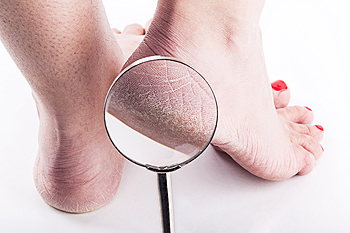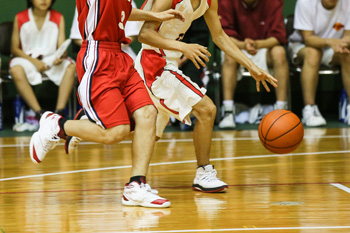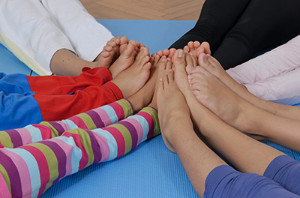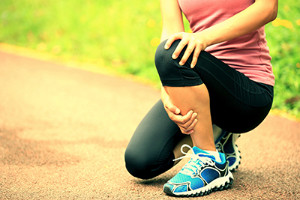Items filtered by date: November 2017
Treating and Preventing Cracked Heels
 Cracked heels are generally a minor and common – albeit discomforting – foot condition. The heels typically become cracked because of a lack of moisture. Therefore, it is important to moisturize your feet if they tend to become dry. Apply a moisturizer twice daily to help prevent the skin on the feet from becoming cracked. Washing your feet daily in a foot bath can help as well. It is important to keep the foot dry beyond moisturizing because bacteria and fungus thrive in wet and hot environments, like the feet. Wear socks that allow the feet to breath. Cotton socks are standard wear for most people and should be fine, but synthetic socks generally wick away moisture and allow for better air circulation. Similarly, shoes should be breathable as well.
Cracked heels are generally a minor and common – albeit discomforting – foot condition. The heels typically become cracked because of a lack of moisture. Therefore, it is important to moisturize your feet if they tend to become dry. Apply a moisturizer twice daily to help prevent the skin on the feet from becoming cracked. Washing your feet daily in a foot bath can help as well. It is important to keep the foot dry beyond moisturizing because bacteria and fungus thrive in wet and hot environments, like the feet. Wear socks that allow the feet to breath. Cotton socks are standard wear for most people and should be fine, but synthetic socks generally wick away moisture and allow for better air circulation. Similarly, shoes should be breathable as well.
Cracked heels are unsightly and can cause further damage to your shoes and feet. If you have any concerns, contact one of our podiatrists from Pennsylvania. Our doctors can provide the care you need to keep you pain-free and on your feet.
Cracked Heels
Cracked heels appear unappealing and can make it harder for you walk around in sandals. Aside from looking unpleasant, cracked heels can also tear stockings, socks, and wear out your shoes. There are several methods to help restore a cracked heel and prevent further damage.
How Do You Get Them?
Dry skin is the number one culprit in creating cracked heels. Many athletes, walkers, joggers, and even swimmers suffer from cracked heels. Age and skin oil production play a role to getting cracked heels as well.
Promote Healing
Over the counter medicines can help, especially for those that need instant relief or who suffer from chronic dry feet.
Wear Socks – Wearing socks with medicated creams helps lock in moisture.
Moisturizers – Applying both day and night will help alleviate dryness which causes cracking.
Pumice Stones – These exfoliate and remove dead skin, which allows for smoother moisturizer application and better absorption into the skin.
Change in Diet
Eating healthy with a well-balanced diet will give the skin a fresh and radiant look. Your body responds to the kinds of food you ingest. Omega-3 fatty acids and zinc supplements can also revitalize skin tissue.
Most importantly, seek professional help if unsure how to proceed in treating cracked heels. A podiatrist will help you with any questions or information needed.
If you have any questions, please feel free to contact one of our offices located in Plymouth Meeting and Ambler, PA . We offer the newest diagnostic and treatment technologies for all your foot care needs.
UCF Knights Point Guard Suffers Foot Injury
 University of Central Florida (UCF) Knights point guard B.J. Taylor has suffered a bone fracture in his foot. Coach Dawkins announced that Taylor will miss between four to six weeks. Taylor’s injury is a further strain on the Knights, as two other players also suffered recent injuries. While the injury is unfortunate, it is not a season-ending one; he is expected to return.
University of Central Florida (UCF) Knights point guard B.J. Taylor has suffered a bone fracture in his foot. Coach Dawkins announced that Taylor will miss between four to six weeks. Taylor’s injury is a further strain on the Knights, as two other players also suffered recent injuries. While the injury is unfortunate, it is not a season-ending one; he is expected to return.
Sports related foot and ankle injuries require proper treatment before players can go back to their regular routines. For more information, contact one of our podiatrists of Pennsylvania. Our doctors can provide the care you need to keep you pain-free and on your feet.
Sports Related Foot and Ankle Injuries
Foot and ankle injuries are a common occurrence when it comes to athletes of any sport. While many athletes dismiss the initial aches and pains, the truth is that ignoring potential foot and ankle injuries can lead to serious problems. As athletes continue to place pressure and strain the area further, a mild injury can turn into something as serious as a rupture and may lead to a permanent disability. There are many factors that contribute to sports related foot and ankle injuries, which include failure to warm up properly, not providing support or wearing bad footwear. Common injuries and conditions athletes face, including:
- Plantar Fasciitis
- Plantar Fasciosis
- Achilles Tendinitis
- Achilles Tendon Rupture
- Ankle Sprains
Sports related injuries are commonly treated using the RICE method. This includes rest, applying ice to the injured area, compression and elevating the ankle. More serious sprains and injuries may require surgery, which could include arthroscopic and reconstructive surgery. Rehabilitation and therapy may also be required in order to get any recovering athlete to become fully functional again. Any unusual aches and pains an athlete sustains must be evaluated by a licensed, reputable medical professional.
If you have any questions please feel free to contact one of our offices located in Plymouth Meeting and Ambler, PA . We offer the newest diagnostic and treatment technologies for all your foot and ankle needs.
Many Children Wear Shoes that are the Wrong Size
 Buying the right size shoes for children can be a tough but important task. Unlike adults, children’s feet are still developing and require adequate shoe space so that their feet aren't constricted. A recent survey of 2000 parents found that many children wear shoes that are the wrong size. Shoes that are too small can cause foot conditions like hammertoes and exacerbate bunions. Shoes that are too big can make trips and falls more likely. With this in mind when shopping for shoes, have your children’s feet measured properly by a store clerk or with a foot measuring device. If one foot is slightly larger than the other, go with the larger foot size. Make sure that your children have enough toe space and that the shoe isn’t too tight. Finally, children’s feet are constantly growing, so make sure to measure their feet every time you go shoe shopping.
Buying the right size shoes for children can be a tough but important task. Unlike adults, children’s feet are still developing and require adequate shoe space so that their feet aren't constricted. A recent survey of 2000 parents found that many children wear shoes that are the wrong size. Shoes that are too small can cause foot conditions like hammertoes and exacerbate bunions. Shoes that are too big can make trips and falls more likely. With this in mind when shopping for shoes, have your children’s feet measured properly by a store clerk or with a foot measuring device. If one foot is slightly larger than the other, go with the larger foot size. Make sure that your children have enough toe space and that the shoe isn’t too tight. Finally, children’s feet are constantly growing, so make sure to measure their feet every time you go shoe shopping.
Making sure that your children maintain good foot health is very important as they grow. If you have any questions, contact one of our podiatrists of Pennsylvania. Our doctors can provide the care you need to keep you pain-free and on your feet.
Keeping Children's Feet Healthy
Having healthy feet during childhood can help prevent medical problems later in life, namely in the back and legs. As children grow, their feet require different types of care. Here are some things to consider...
Although babies do not walk yet, it is still very important to take care of their feet.
Avoid putting tight shoes or socks on his or her feet.
Allow the baby to stretch and kick his or her feet to feel comfortable.
As a toddler, kids are now on the move and begin to develop differently. At this age, toddlers are getting a feel for walking, so don’t be alarmed if your toddler is unsteady or ‘walks funny’.
As your child gets older, it is important to teach them how to take care of their feet.
Show them proper hygiene to prevent infections such as fungus.
Be watchful for any pain or injury.
Have all injuries checked by a doctor as soon as possible.
Comfortable, protective shoes should always be worn, especially at play.
If you have any questions please feel free to contact one of our offices located in Plymouth Meeting and Ambler, PA . We offer the newest diagnostic and treatment technologies for all your foot and ankle needs.
Preventing Running Injuries in the Fall
 Autumn is a lovely time of the year but can present some difficulties for runners. While generally not a dangerous time to run, there are some tips one should consider to help prevent running injuries in the fall. Avoid ground that is covered in leaves. This is important, as leaves can be wet and make slips more likely. Furthermore, leaves can also cover up holes in the ground, mud, or other obstacles that can cause you to fall or hurt your foot or ankle. Another tip is to wear brighter or more contrasting colors if you run alongside a road or woodlands. This will keep you visible to drivers. Regardless of whenever or wherever you run, staying alert of your surroundings and following some basic safety tips can monumentally help prevent any running injuries.
Autumn is a lovely time of the year but can present some difficulties for runners. While generally not a dangerous time to run, there are some tips one should consider to help prevent running injuries in the fall. Avoid ground that is covered in leaves. This is important, as leaves can be wet and make slips more likely. Furthermore, leaves can also cover up holes in the ground, mud, or other obstacles that can cause you to fall or hurt your foot or ankle. Another tip is to wear brighter or more contrasting colors if you run alongside a road or woodlands. This will keep you visible to drivers. Regardless of whenever or wherever you run, staying alert of your surroundings and following some basic safety tips can monumentally help prevent any running injuries.
Exercising your feet regularly with the proper foot wear is a great way to prevent injuries. If you have any concerns about your feet, contact one of our podiatrists of Pennsylvania. Our doctors will treat your foot and ankle needs.
How to Prevent Running Injuries
Many common running injuries are caused by overuse and overtraining. When the back of the kneecap starts wearing out and starts causing pain in your knee, this is commonly referred to as runner’s knee. Runner’s knee is a decrease in strength in your quadriceps and can occur if you’re not wearing properly fitted or supporting shoes. To prevent runner’s knee, focusing on hip strengthening is a good idea, as well as strengthening your quads to keep the kneecaps aligned.
What Are Some Causes of Running Injuries?
- One cause of a common running injury is called iliotibial band syndrome.
- Plantar fasciitis is also another common injury.
- Stress fractures can occur from overtraining, lack of calcium, or even your running style.
Best Ways to Prevent Running Injuries
- Wear footwear that fits properly and suits your running needs.
- Running shoes are the only protective gear that runners have to safeguard them from injury.
- Make a training schedule. Adding strengthening exercises as well as regular stretching can help keep you strong and limber and can lessen the possibility of injuries.
- Stretching keeps muscles limber; this will help you gain better flexibility.
If you have any questions please feel free to contact one of our offices located in Plymouth Meeting and Ambler, PA . We offer the newest diagnostic and treatment technologies for all your foot and ankle needs.
